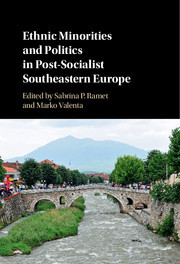Description
Ethnic Minorities and Politics in Post-Socialist Southeastern Europe
Coordinators: Ramet Sabrina P., Valenta Marko
Southeast European politics cannot be understood without considering ethnic minorities. This book is a comprehensive introduction to ethnic political parties.
Language: English
Subject for Ethnic Minorities and Politics in Post-Socialist...:
Publication date: 09-2016
Support: Print on demand
Support: Print on demand
Description
/li>Contents
/li>Biography
/li>
Southeast European politics cannot be understood without taking ethnic minorities into account. This book provides a comprehensive introduction to the politics of ethnic minorities, examining both their political parties and issues of social distance, migration, and ethnic boundaries, as well as issues related to citizenship and integration. Coverage includes detailed analyses of Hungarian minority parties in Romania, Albanian minority parties in Macedonia, Serb minority parties in Croatia, Bosniak minority parties in Serbia, and various minority parties in Montenegro, as well as the Movement for Rights and Freedoms, a largely Turkish party, in Bulgaria.
Part I. Setting the Scene: 1. Situating ethnic minorities in post-socialist Southeastern Europe: an introduction Marko Valenta and Sabrina P. Ramet; 2. Ethnic politics in post-socialist Southeastern Europe: an overview Janusz Bugajski; 3. Social distance toward ethnic minorities in Croatia, Serbia, Montenegro, Macedonia, and Kosovo: a comparative analysis Zan Strabac and Marko Valenta; Part II. Political Engagements and Formations: 4. Ethnic minority parties of Romania Aurel Braun; 5. Albanian political parties in Macedonia Zachary T. Irwin; 6. The organization and political position of Serbs in Croatia Filip Škiljan; 7. For the love of homeland: Croat ethnic party politics in Bosnia-Herzegovina Jelena Subotić; 8. Ethnic minority parties in Montenegro: from marginalisation to integration Kenneth Morrison; 9. The Movement for Rights and Freedoms in Bulgaria: beyond the ethnic vote Maria Spirova; 10. Bosniak politics in Serbia: the struggle for recognition, emancipation, and historical revisionism Aleksander Zdravkovski; Part III. Ethnic Boundaries and Inclusion and Exclusion of Ethnic Minorities: 11. Hungarian society in Romania: political project and practical reality Irina Culic; 12. Minority (Serb) returnees to Croatia: reintegration or new immigration? Milan Mesić and Dragan Bagić; 13. Nationalizing citizenship: the case of unrecognized ethnic minorities in Slovenia Mojca Pajnik; 14. Ethnic boundaries and the position of minority groups in Croatian Istria Marko Valenta, Snježana Gregurović and Zan Strabac; 15. Ethnic boundaries and politics in Kosovo Fred Cocozzelli; Part IV. Conclusion: 16. Afterword: a few thoughts about autonomy and separatism Sabrina P. Ramet.
Sabrina P. Ramet is a Professor of Political Science at the Norwegian University of Science and Technology (NTNU), Trondheim, Norway. She was elected in 2002 to membership in the Royal Norwegian Society of Sciences and Letters and in 2009 to membership in the Norwegian Academy of Science and Letters. She earned her bachelor's degree in Philosophy at Stanford University, Califrornia, her master's degree in International Relations with the University of Arkansas, and her Ph.D. in Political Science at the University of California, Los Angeles. She is the author of twelve scholarly books, and editor or co-editor of 31 books - among them, Religion and Politics in Central and Southeastern Europe: Challenges since 1989 (2014) and Gender (In)equality and Gender Politics in Southeastern Europe: A Question of Justice, co-edited with Christine M. Hassenstab (2015). She has written more than one hundred journal articles and has contributed chapters to various scholarly collections.
Marko Valenta is a Professor at the Department of Social Work and Health Science at the Norwegian University of Science and Technology (NTNU), Trondheim, Norway. He is also a Senior Researcher at the NTNU Social Research. He studied Law at the University of Split, Croatia, and Sociology, Social Science and Geography at NTNU. He also earned his Ph.D. in Sociology at NTNU. He is author or co-editor of three previous books and author or co-author of more than sixty journal articles, research reports, and book chapters focusing on ethnic relations, international migrations, and the Yugoslav successor states. Valenta is a member of the European IMISCOE Research Network and board member of Nordic Migrations and Ethnic Relations research network. He coordinates the International Migrations and Ethnic Relations Research Network for Southeastern Europe.
Marko Valenta is a Professor at the Department of Social Work and Health Science at the Norwegian University of Science and Technology (NTNU), Trondheim, Norway. He is also a Senior Researcher at the NTNU Social Research. He studied Law at the University of Split, Croatia, and Sociology, Social Science and Geography at NTNU. He also earned his Ph.D. in Sociology at NTNU. He is author or co-editor of three previous books and author or co-author of more than sixty journal articles, research reports, and book chapters focusing on ethnic relations, international migrations, and the Yugoslav successor states. Valenta is a member of the European IMISCOE Research Network and board member of Nordic Migrations and Ethnic Relations research network. He coordinates the International Migrations and Ethnic Relations Research Network for Southeastern Europe.
© 2024 LAVOISIER S.A.S.




